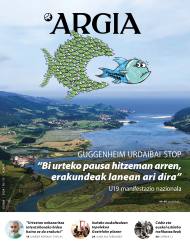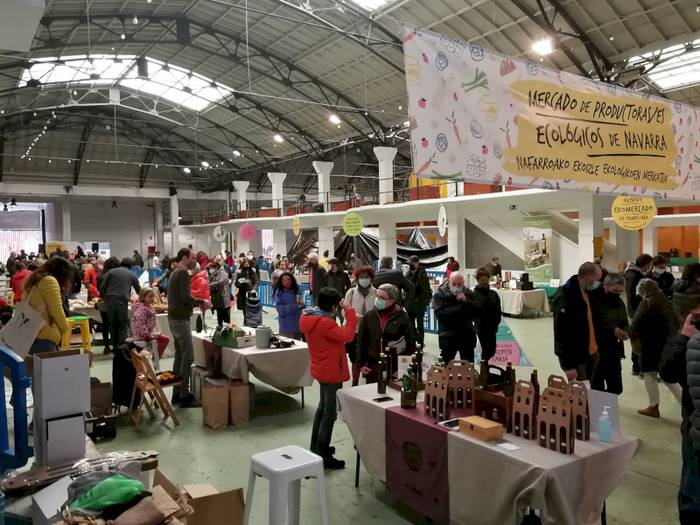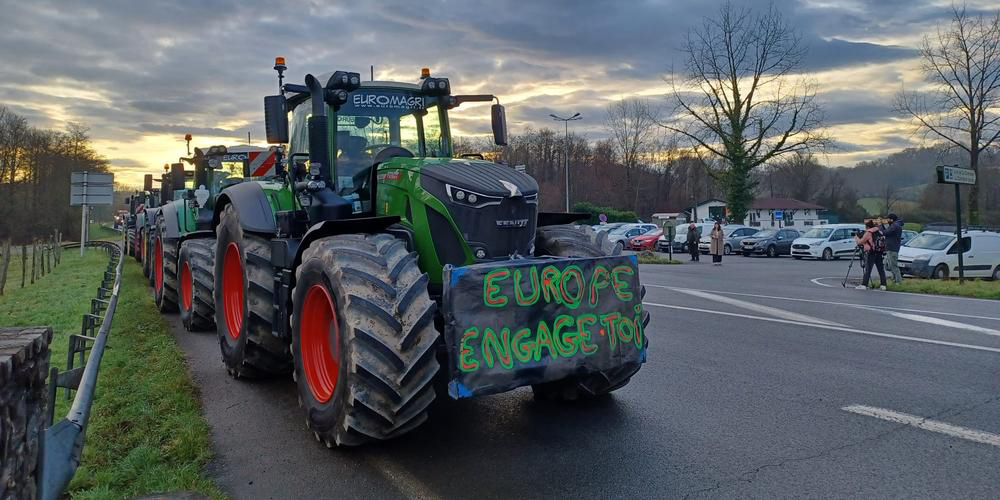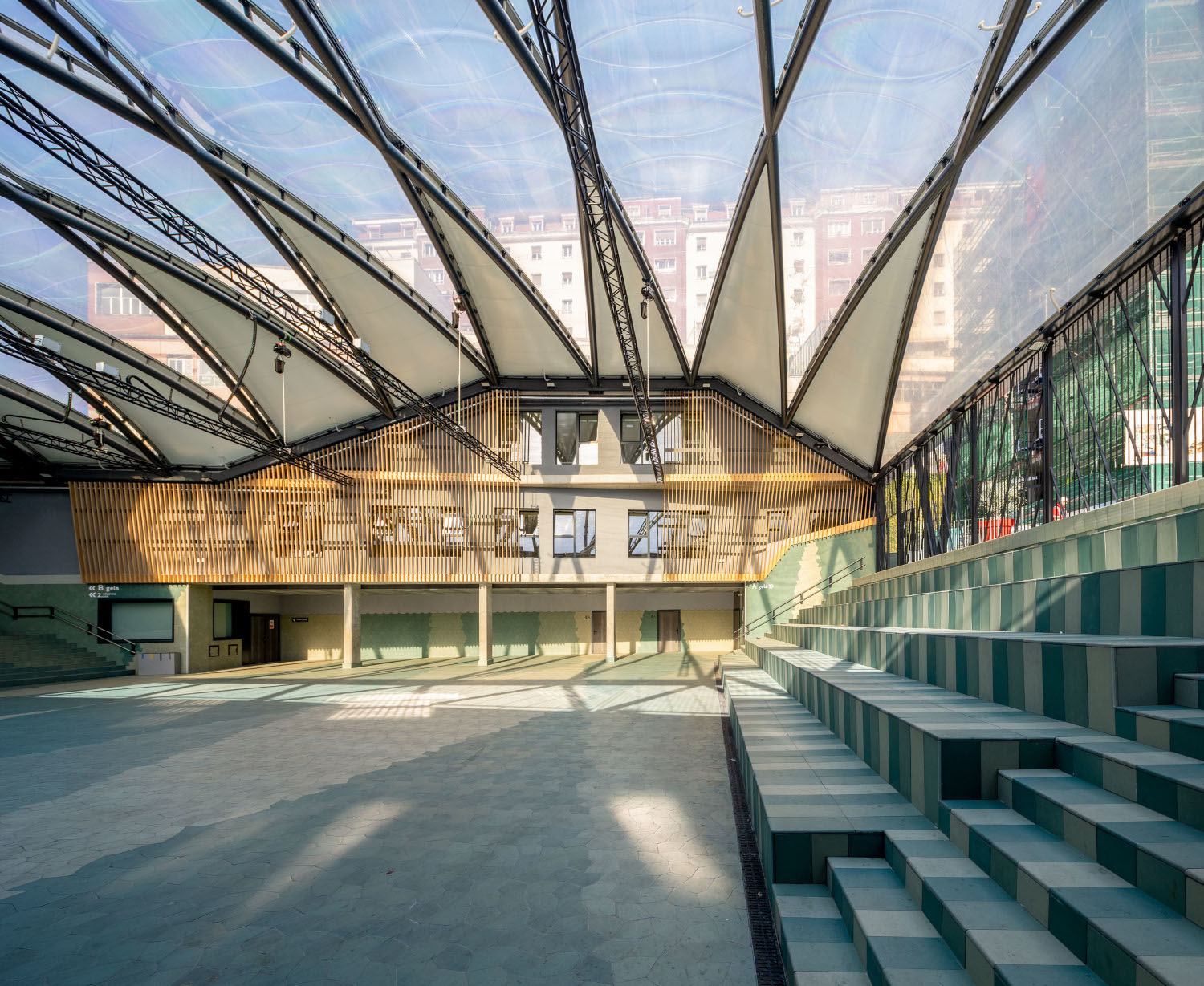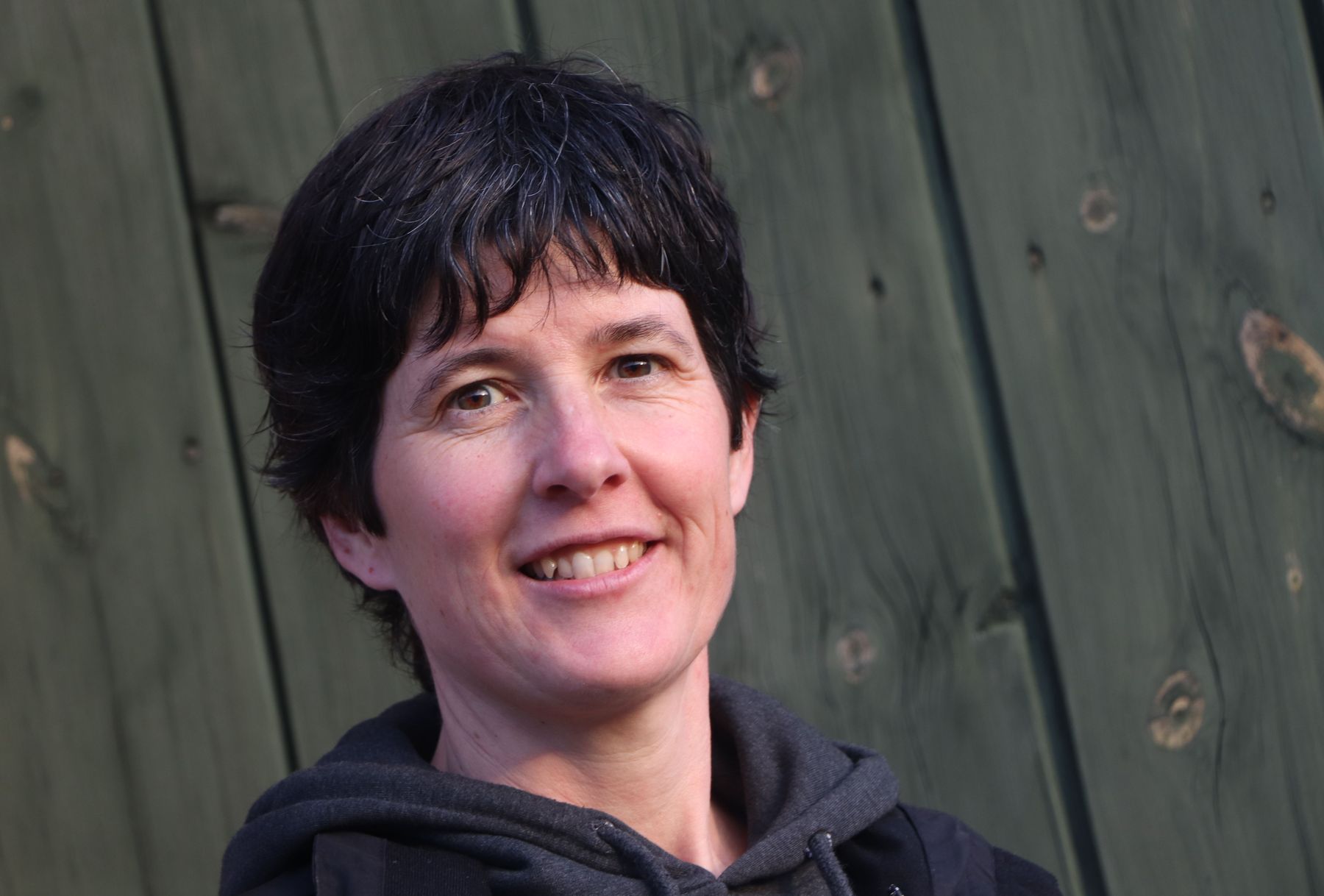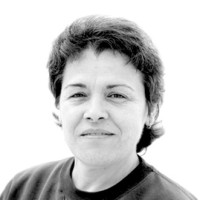"The defense of the same agricultural model by ENBA and EHNE in Gipuzkoa says a lot"
- Xabier Arriaga saw a woman drinking a coffee with skimmed milk and a bollo of butter in a coffee shop in Gernika. Then he realized the contradictions that the capitalist system wants us to accustom to.

Xabier Arriaga, 'Txiplas' (Errigoiti, 1957)
He studied Mechanic Adjuster in Vocational Training, but has never gone for the title. He has preferred to do what he believes and believe when he does. He's had retirement age, but he explains that the word retired comes from Latin: “It comes from jubilee and means to enjoy.” There is no doubt that Txiplem, in addition to working in Bizkaigane, continues to enjoy.
In the 1980s, new agricultural policies were written and small baserritars began to disappear. Instead, you created a cooperative based on extensive agriculture.
We were young people who wanted to dedicate ourselves to agriculture, but it was clear to us that what we were doing would sell it directly.
Then the big milk factories emerged and the alternative offered was the sale of milk.
Yes, but there were baserritars that sold milk directly. They would go down to Gernika with the canteens and each buyer would give their boat what they needed. As for health conditions, we saw that it wasn't the way to the canteens, and we started selling milk in plastic bags. Believing we had made progress, we went back! Over time, we've taken out the plastic and sold the milk in glass bottles. Then we collect the bottles to reuse them.
Did you have the cooperative from the very beginning?
Of philosophy, yes. However, according to the law at the time, to be a cooperative, at least six partners were needed, and we weren't that many. As for the functioning, we have always worked together without status: we have had no bosses. Here we've all been the same.
Have you managed to maintain this philosophy?
Of those of us who were at the beginning because of the circumstances of life, Jon Barainka, Saskel, and I have stayed so far. A lot of people have gone through Bizkaigane, but we've moved our philosophy from the old pavilion to the new one. Once we reached an age, it would be a pity to abandon what we've endured for 40 years, and we started to think about how to make the generational shift. The students have come from Derio, Fraisoro or Artzai Eskola to do internships, and some have stayed here working. There was also here with us a nephew of Saskel and Leire who lived in the village. He's a biologist in fact, but here he was and he is. We've worked on a project for 40 years, and we've given them that, because we're ever going to kill each other!
Do they provide ideas for extensive agriculture or is it intensive what is transmitted?
For many years, both in agricultural schools and in the administration, only one intensive path has been demonstrated. They came from Derio with the idea of hydroponics, those from the Pastors School thinking about the pavilions of 400-500 sheep and learning how to exploit the cows intensively. Now, I think the students say that's not what they want to do.
.jpg)
Has it cost us a lot to see the risks of intensive care in general?
We started in Bizkaigane and soon entered the European Common Market. Until then, of course, here were cows in the farmhouses, but at the very most they were farms of fifteen mares. European legislation changed everything. A single production was used: milk, meat or vegetables. At that time, the EHNE trade union organised a trip to learn about the consequences of intensive farming. We were in Brittany, Germany and Belgium. We saw that the small farmhouses were lost, the small slaughterhouses disappeared, the land was contaminated... then for the first time I saw organic farming. On the return of this journey, we were still not fully defining what we wanted to do, but we were clear about what we didn't want to do.
Until then, didn't they make ecological?
I believe that there are two types of agriculture: the logic and the logic. We, without knowing much, maintained the logic. Then there was no organic feed, but we have always walked cows through pastures, for example. We decided not to use chemical fertilizers in the prairies. What for? Before we were born, there were pastures and they were not thrown away. Then we were in Álava and Navarre looking for cereal producers, and there we met Alfredo in Álava. Over the years, we and he have both achieved eco-certification and diversified, but our logic has been to make sustainable agriculture from the very beginning.
Has the time given you the reason?Intensive
agriculture is not good either for society or for health: bursting the cow for two years, depleting the land… and all that for what? To make food worse and worse? It doesn't make sense. The administration, both European and here, knows that, but agro-industry and agrochemicals have a lot of money in motion.
In those 40 years, how do you see that the sector has changed?
We are now a minority, but the young people who settle in the farmhouse in recent years are increasingly going to the extension. Perhaps, if you go to Navarre, to Álava… the productive cereals will be intensive, but in general, they increasingly come to the ecological and the extensive. The point is that the administration has not made a real bet. Subsidies are distributed, but the subsidies given to the intensive, for example, are almost entirely fed by agrochemicals. There is no interest in betting on an extensive model. 40 years ago we were taken insane, but also before us were sheep and cows and there was no such dependence on big feed companies or on medicines.
You have been an example for many young people in the area.
I believe that in this the foremen were our predecessors. We get the work out of the house. Instead of working as a couple or as a family, we created a cooperative. This facilitates work, family life and relief. We saw that this family production was limited. If you get sick or you die, it's over. By the way, all the farms were in the name of men and the work was done by women.
.jpg)
It is true that in the previous model the relay cost, you are doing it now.
Yes, we are. Here's half a dozen people to get to Bizkaigane. Society has changed, however. We have begun to define timetables: some work in the morning and others in the afternoon. Not as we did, half a day: 12 hours (ha, ha). Many of the young people who have been here have told us that the responsibility for the project is too great.
Has the responsibility for the project also been weighed up for you?
Not for us. It is true that we have done a lot of work, but we have not followed what the system was telling us. We have guided our work and our lives. We've met a lot of people who put 100 or 200 cows and are now looking forward to retirement. Agriculture is experiencing disillusionment and we have kept the illusion.
You have also been involved in the agricultural union.
We have not been enlightened! We have had contact with the union and have experienced the processes that have taken place in the union. When they emerged, the model was unique and the same was paid to a liter of milk that produced 1,000 liters or 10 liters. The capitalist system fixed everything in its own way and began to pay more to whoever produced more liters. What did they want? Well, instead of going to 100 farms to collect 10,000 liters of milk, go to just ten. And small farms have drowned to the benefit of large farms. There were also discussions between us. The unions had to decide which model they would support. In the EHNE confederation, for example, discussion was avoided. We did not understand how to defend both models, and in the end it came out of the Bizkaina Confederation of EHNE. Not everything is defended. If you go to Gipuzkoa or Navarra, the unions that are more on the left or more on the right defend the same thing: intensive agriculture. I see no sense.
Do you think that the Left, when it came to power, did not know what to do with agriculture?
We think we are left-wing in ideology, but in everyday life… The defense of the same agricultural model by ENBA and EHNE from Gipuzkoa says a lot. At the time we debated whether those of us on the left had to create another trade union, but EHNE in Bizkaia defends what I want to defend. I don't need anything else. However, when the EHNE confederation broke, we created the Etxalde movement. There we are EHNE Bizkaia, ELB and a group of individual baserritarras.
Given the current situation, what are we missing from a radical change in the agricultural model?
The Administration must opt for a sustainable model, as it has done so far for an intensive model. We must make the land easier for young people and help those who have to invest.
Speaking of land appropriation, don't we have a problem with property?
Yes, we do not consider land as a working tool. There have been people who have preferred to introduce pine or eucalyptus before leaving the earth to anyone. Others, however, have not known what to do with the earth. The EHNE promoted the creation of a land bank, but with the guarantee of the administration. In the end, if you don't have land guaranteed in the long term, you can't make investments. Subsidies are also granted for the fact that land is the only land and with it people supplement their wages. However, we will have to compensate for the low pensions so that these areas are used for work.
In the case of direct sales, fairs, at least in the area here [in Busturialdea], are in decline. What happened?
The first change we saw was the department stores. Before they were shopping every day and we sold milk every day, but when the pasteurized and the uperized started, people started buying for the whole month. Then European law brought the skimmed, the semi-skimmed... and we did not sell all the milk we produce every day. We had two options: either to sell or to diversify the industry. We started making cheese. At first only fresh and already several kinds of cheese. As we made the cheese, we had serum and to use it we started to fatten the pigs. First for us, for partners, and today we sell chorizo. One thing has led us to the other, always in a logical chain.
.jpg)
Are you really going to retire, Txiplas?
I know I don't have to. When I leave Bizkaigane is going to go on and he has to go on like this. I continue to collaborate and try to convey what I know. This is not a factory. “I’m leaving and farewell.”
For you Bizkaigane has been much more than work.
Bizkaigane has been an important pillar in my life project. We have made the way to make the agriculture we wanted, we have fled the agriculture imposed by the system and we have built networks between producers and between buyers and productores.Tambihas
also built other networks. Between Jon Lopategi and our generation, you were the first bertsos school in Gernika-Lumo.
I have always liked the verse, and I have heard that Jon Lopategi wanted to create a bertso-eskola in Gernika. So we were going to bertsolaris schools, not the kids. At that time, we started the AEK Saskel and I night school, which we founded the cooperative. Once at Potin's bar in Errigoiti came Lopategi and one of those walking around AEK told him there was a guy singing bertsos in Errigoiti, and Lopategi told me that if I was looking for some of my kids, I would start school. I picked up the cattle from the mountains! Los Arriola [Alex, Damián and Josu Arriola], [José Luis] Obieta, Damián [Erdaide] de Okana, Javier Bidaburu, Txirri de Ereño… The first session was held in San Cristobal de Forua.
Bizkaigane has been your life and Bertsolarism what has it been?
The bertso always liked me. I don't know where, but I've always had it inside. At bertsolaris school we spent a lot, then we jumped to the plaza, to the championship… I’ve always been at ease.
Working outdoors, singing bertsos in the plaza… but you have also had to be in the shade for a few years.
That is it! Nationalism we received from home, I think in Euskal Herria, and I thought it had to be there as well. He touched my jail. In any case, I have been lucky that some of those who have accompanied me have turned twenty-four years inside and I have five and a half. At the time of jail, I was also helped by the verses. To have a bertso or a strafal thought in an unfavorable situation gives strength.
I also sang bertsos at the National High Court! They took me to Rosi Arana's trial and I asked the lawyer if what I was going to say could change something. Do you know how they say it in cowboy movies? “You will have a fair trial and we will hang you at dawn.” The same thing happens in the National Court: as soon as it is judged, the judgment is delivered. So I thought I would answer in verse, but not just answer. The verse also has to serve for criticism, and the judge who judged Arana released Ynestrillas a couple of weeks earlier. I ended the verse: “You should release Rosi and stop Ynestrillas.” What to do? At dawn they would hang us in the same way, but there was the jury, the audience and the prison theme.
Have you ever regretted going to the factory like many men in the early 1980s and not leading a more normal life?
No, and I would say Saskela, either. We have been convinced of what we have done and I have never regretted it. I don't think I'll be born again, but I'll do this bet again. We have made mistakes, but we have also made mistakes. If we started again, we wouldn't make the same mistakes, but we would make others.
Martxoaren 1ean ospatuko du NNPEK-k urteurrena argazki erakusketa eta txalaparta ikuskizun batekin.
The Sanmartines are well known in our homes, as it is time to kill the pig. However, many people will not know that before St. Martin's day marked the end of the agricultural year. And that was no nonsense. In fact, at the end of the year, I had to pay an annual rent to my... [+]
Are baserritars on vacation? They ask in school. The students have answered no. So, working every day, would you like to be baserritarra in the future? And if nobody wants to be a baserritarra, who is going to make food for us? The question stayed in the air.
For the health and... [+]
Much of the current left-wing movement, albeit intuitively, claims small-scale agriculture, without any doubt. However, this claim for smallness has its contradictions: a small farm, by definition, will not be able to produce a lot of food. And is that important? Well, in a... [+]
We have seen the peasants with power tractors, roads, bridges, blocking borders, and the heart made us “krak!” in solidarity, because we are also peasants children and brothers, because they are still striving to bring the farms ahead. We've heard protesters criticizing the... [+]
On 9 February, EHNE-Bizkaia and ENBA-Bizkaia, convened in Bilbao, held a concentration of demonstrations between the baserritars of Bizkaia and neighbours and neighbours who approached to show their solidarity. About a hundred tractors from different districts joined the area of... [+]









